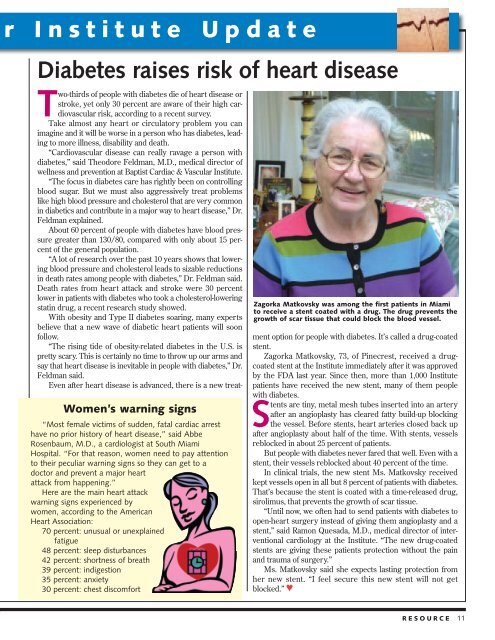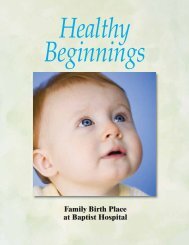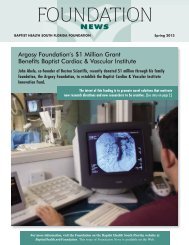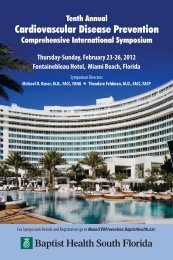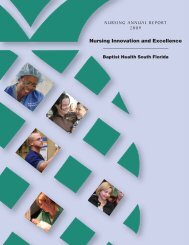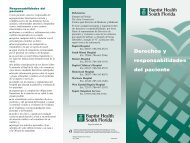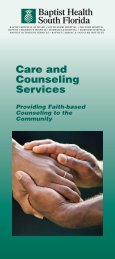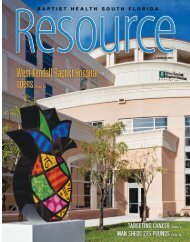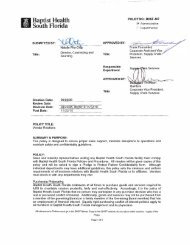Resource: Spring 2004 - Baptist Health South Florida
Resource: Spring 2004 - Baptist Health South Florida
Resource: Spring 2004 - Baptist Health South Florida
- TAGS
- baptist
- baptisthealth.net
Create successful ePaper yourself
Turn your PDF publications into a flip-book with our unique Google optimized e-Paper software.
Institute Update<br />
Diabetes raises risk of heart disease<br />
Two-thirds of people with diabetes die of heart disease or<br />
stroke, yet only 30 percent are aware of their high cardiovascular<br />
risk, according to a recent survey.<br />
Take almost any heart or circulatory problem you can<br />
imagine and it will be worse in a person who has diabetes, leading<br />
to more illness, disability and death.<br />
“Cardiovascular disease can really ravage a person with<br />
diabetes,” said Theodore Feldman, M.D., medical director of<br />
wellness and prevention at <strong>Baptist</strong> Cardiac & Vascular Institute.<br />
“The focus in diabetes care has rightly been on controlling<br />
blood sugar. But we must also aggressively treat problems<br />
like high blood pressure and cholesterol that are very common<br />
in diabetics and contribute in a major way to heart disease,” Dr.<br />
Feldman explained.<br />
About 60 percent of people with diabetes have blood pressure<br />
greater than 130/80, compared with only about 15 percent<br />
of the general population.<br />
“A lot of research over the past 10 years shows that lowering<br />
blood pressure and cholesterol leads to sizable reductions<br />
in death rates among people with diabetes,” Dr. Feldman said.<br />
Death rates from heart attack and stroke were 30 percent<br />
lower in patients with diabetes who took a cholesterol-lowering<br />
statin drug, a recent research study showed.<br />
With obesity and Type II diabetes soaring, many experts<br />
believe that a new wave of diabetic heart patients will soon<br />
follow.<br />
“The rising tide of obesity-related diabetes in the U.S. is<br />
pretty scary. This is certainly no time to throw up our arms and<br />
say that heart disease is inevitable in people with diabetes,” Dr.<br />
Feldman said.<br />
Even after heart disease is advanced, there is a new treat-<br />
Women’s warning signs<br />
“Most female victims of sudden, fatal cardiac arrest<br />
have no prior history of heart disease,” said Abbe<br />
Rosenbaum, M.D., a cardiologist at <strong>South</strong> Miami<br />
Hospital. “For that reason, women need to pay attention<br />
to their peculiar warning signs so they can get to a<br />
doctor and prevent a major heart<br />
attack from happening.”<br />
Here are the main heart attack<br />
warning signs experienced by<br />
women, according to the American<br />
Heart Association:<br />
70 percent: unusual or unexplained<br />
fatigue<br />
48 percent: sleep disturbances<br />
42 percent: shortness of breath<br />
39 percent: indigestion<br />
35 percent: anxiety<br />
30 percent: chest discomfort<br />
Zagorka Matkovsky was among the first patients in Miami<br />
to receive a stent coated with a drug. The drug prevents the<br />
growth of scar tissue that could block the blood vessel.<br />
ment option for people with diabetes. It’s called a drug-coated<br />
stent.<br />
Zagorka Matkovsky, 73, of Pinecrest, received a drugcoated<br />
stent at the Institute immediately after it was approved<br />
by the FDA last year. Since then, more than 1,000 Institute<br />
patients have received the new stent, many of them people<br />
with diabetes.<br />
Stents are tiny, metal mesh tubes inserted into an artery<br />
after an angioplasty has cleared fatty build-up blocking<br />
the vessel. Before stents, heart arteries closed back up<br />
after angioplasty about half of the time. With stents, vessels<br />
reblocked in about 25 percent of patients.<br />
But people with diabetes never fared that well. Even with a<br />
stent, their vessels reblocked about 40 percent of the time.<br />
In clinical trials, the new stent Ms. Matkovsky received<br />
kept vessels open in all but 8 percent of patients with diabetes.<br />
That’s because the stent is coated with a time-released drug,<br />
sirolimus, that prevents the growth of scar tissue.<br />
“Until now, we often had to send patients with diabetes to<br />
open-heart surgery instead of giving them angioplasty and a<br />
stent,” said Ramon Quesada, M.D., medical director of interventional<br />
cardiology at the Institute. “The new drug-coated<br />
stents are giving these patients protection without the pain<br />
and trauma of surgery.”<br />
Ms. Matkovsky said she expects lasting protection from<br />
her new stent. “I feel secure this new stent will not get<br />
blocked.” ♥<br />
RESOURCE 11


